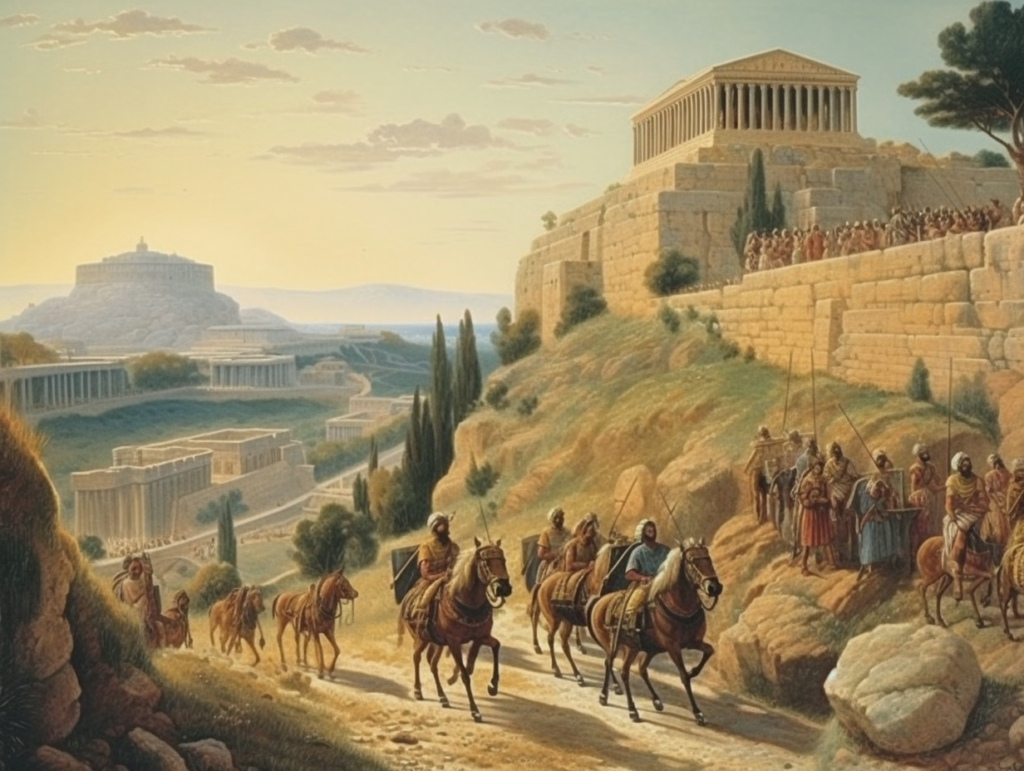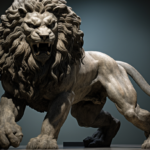Are you ready to embark on a journey to Ancient Greek Troy?
Discover the captivating blend of myth and history that awaits you. Uncover the origins of the Legend of Troy and delve into the age-old debate of whether the Trojan War was fact or fiction.
Brace yourself for the archaeological wonders that lie in wait, and explore the heroic figures that shaped this ancient city. Prepare to be amazed by the enduring influence of Troy on Greek literature and art.
Let the adventure begin!
Key Takeaways
- The Trojan War, sparked by the abduction of Helen, lasted for ten years and involved famous heroes like Achilles and Odysseus.
- The existence of the Trojan War has been debated, but written accounts and archaeological findings support its occurrence.
- The ruins of Troy provide evidence of a great ancient city destroyed by war, and exploring the archaeological site allows visitors to imagine its grandeur.
- Troy’s influence on Greek literature and art is undeniable, with the Trojan War serving as the backdrop for epic poems and inspiring Greek artists in pottery and sculpture.
The Legend of Troy: Origins and Mythology
If you’ve ever wondered about the origins and mythology surrounding the legendary city of Troy, you’re in for a fascinating journey. The story of Troy, as immortalized in Homer’s epic poem, the Iliad, has captivated people for centuries.
According to Greek mythology, Troy was founded by a prince named Ganymede, who was the son of Tros, the king of Dardania. The city was said to be located in what’s now modern-day Turkey.
The most famous tale associated with Troy is the Trojan War, which lasted for ten years. It all began when Paris, a prince of Troy, abducted Helen, the wife of Menelaus, the king of Sparta. This act sparked a conflict between the Greeks and the Trojans, resulting in a brutal war. The Greeks, led by heroes such as Achilles and Odysseus, besieged Troy for years before finally breaching its walls with the help of the famous Trojan Horse.
While the Trojan War is the most well-known aspect of Troy’s mythology, the city was also believed to be the birthplace of many other legendary figures. For example, Aeneas, a Trojan prince, was said to have survived the war and eventually founded the city of Rome.
These tales and more have made Troy a symbol of heroism, tragedy, and the power of myth throughout history. So, as you explore the legend of Troy, prepare to be transported to a world of gods, warriors, and epic battles.
The Trojan War: Fact or Fiction
As you delve into the history of Troy, you’ll find that the question of whether the Trojan War was fact or fiction has long been debated. Many historians and archaeologists have dedicated their careers to uncovering the truth behind this ancient conflict. While some argue that the Trojan War was merely a mythological tale, others believe that there’s evidence to support its existence.
One of the main pieces of evidence for the Trojan War is the archaeological site of Troy itself. Located in modern-day Turkey, the ruins of Troy provide tangible proof of a great ancient city that was destroyed by war. Excavations at the site have uncovered layers of burnt debris, weapons, and fortifications, all suggesting a violent conflict took place.
In addition to the physical evidence, there are also written accounts of the Trojan War. The most famous of these is Homer’s Iliad, an epic poem that recounts the events of the war. While the Iliad is a work of literature, it’s believed to be based on historical events and has been used by scholars to piece together the story of the Trojan War.
Despite these findings, there are still those who argue that the Trojan War is nothing more than a legend. They point to the lack of concrete proof and the fantastical elements of the story as reasons to doubt its veracity.
Unveiling the Archaeological Treasures of Troy
Explore the awe-inspiring archaeological treasures of Troy, revealing the rich history and captivating stories of this ancient Greek city. As you venture into the ruins, you can’t help but imagine the bustling streets and the grandeur that once existed in this legendary place.
- The Walls of Troy: Stand in awe as you gaze upon the remnants of the mighty walls that protected the city. These walls, built in multiple phases, tell the story of Troy’s evolution and the constant threat of invasion it faced.
- The Citadel: Climb up to the highest point in the city and be greeted by the majestic ruins of the citadel. Here, you can explore the remains of the ancient palace, where kings and queens once ruled over this magnificent city.
- The Temple of Athena: Marvel at the ancient temple dedicated to Athena, the goddess of wisdom and war. Imagine the rituals and ceremonies that took place within its sacred walls, as the people of Troy sought guidance and protection from the gods.
As you wander through the archaeological site of Troy, you can’t help but be transported back in time. Each stone and artifact holds a piece of the city’s history, waiting to be discovered and shared with the world.
Exploring the Heroes of Ancient Troy
As you delve into the ancient city of Troy, you will encounter the heroic figures whose exploits have become legendary. These heroes played a crucial role in the Trojan War, a conflict between the Greeks and Trojans that lasted for ten years. Let’s take a closer look at some of the most renowned heroes of Ancient Troy:
| Hero | Description | Notable Exploits |
|---|---|---|
| Achilles | A formidable warrior and the central character of Homer’s “Iliad.” Known for his invincibility, except for his heel, which became his fatal weakness. | Slaying the Trojan prince Hector and leading the Greeks to victory. |
| Hector | A Trojan prince and the greatest warrior of Troy. He was known for his bravery and sense of duty. | Defending Troy against the Greeks and engaging in a memorable duel with Achilles. |
| Odysseus | A cunning and resourceful Greek hero, known for his intelligence and strategic skills. | Devising the plan of the Trojan Horse, which ultimately led to the fall of Troy. |
| Helen of Troy | The most beautiful woman in the world and the cause of the Trojan War. She was married to the Spartan king Menelaus but eloped with Paris, a Trojan prince. | Her abduction by Paris and subsequent return to Menelaus, causing the war between the Greeks and Trojans. |
These heroes, with their extraordinary abilities and complex personalities, continue to captivate us through their timeless stories. Exploring their exploits allows us to delve deeper into the rich tapestry of Ancient Troy and the mythological world that surrounds it.
The Influence of Troy on Greek Literature and Art
Immerse yourself in the captivating world of Greek literature and art, influenced by the timeless tales and iconic imagery of ancient Troy. The influence of Troy on Greek culture is undeniable, shaping the artistic and literary landscape in profound ways.
Here are three ways in which Troy left its mark:
- Epic Poetry: The Trojan War, immortalized in Homer’s Iliad and Odyssey, served as the backdrop for some of the greatest works of Greek literature. These epic poems not only recounted the heroic deeds of Achilles, Hector, and Odysseus but also explored profound themes of honor, fate, and the consequences of war.
- Pottery and Sculpture: The Trojan War inspired countless Greek artists to depict scenes and characters from the epic tales. Vases and sculptures showcased the bravery of Greek heroes like Ajax and Diomedes, as well as the tragic figure of the Trojan prince, Paris. These artworks provided a visual narrative of the war and its aftermath.
- Architectural Design: The legend of Troy influenced the design of Greek temples and buildings. The iconic Trojan Horse and the formidable walls of Troy became symbols of strength and ingenuity, inspiring architects to incorporate similar elements into their structures. The influence of Troy can be seen in the majestic temples of ancient Greece, such as the Parthenon in Athens.
The enduring legacy of Troy in Greek literature and art continues to captivate audiences, bridging the gap between myth and history.
Frequently Asked Questions
What Is the Significance of the Trojan Horse in the Trojan War?
The Trojan Horse is significant in the Trojan War as a deceptive strategy used by the Greeks to infiltrate and conquer Troy. It allowed them to gain access to the city and ultimately led to their victory.
How Did the City of Troy Come to Be Known as a Legendary City?
The city of Troy came to be known as a legendary city through its central role in the Trojan War, as depicted in ancient Greek mythology and literature. Its fame and mythical status grew over time.
What Were the Major Archaeological Discoveries Made at the Site of Ancient Troy?
You’ll learn about the major archaeological discoveries at the site of ancient Troy. These findings shed light on the city’s history and validate its legendary status. It’s fascinating to see the physical evidence that supports the myths.
Who Were the Main Heroes and Warriors on the Greek Side During the Trojan War?
The main heroes and warriors on the Greek side during the Trojan War were Achilles, Odysseus, and Ajax. They were known for their bravery and skill in battle, and played crucial roles in the outcome of the war.
How Did the Story of Troy Influence Later Greek Literature and Art Forms?
The story of Troy greatly influenced later Greek literature and art forms. It inspired poets and playwrights to create epic poems and tragedies, while artists depicted scenes from the Trojan War in their paintings and sculptures.







